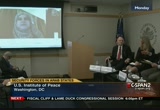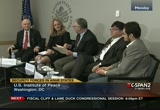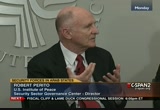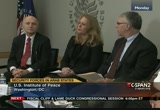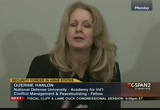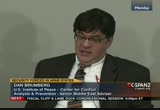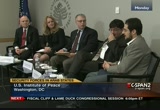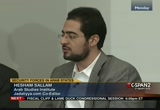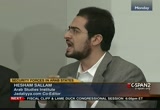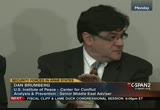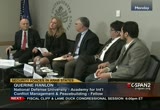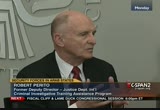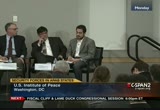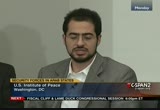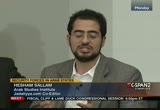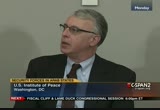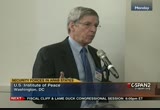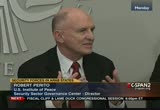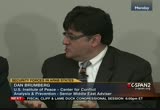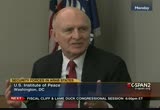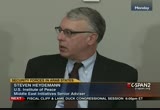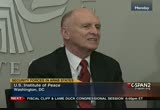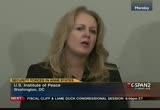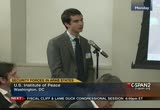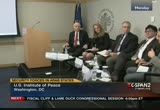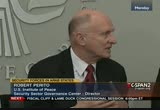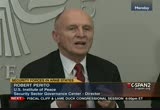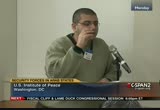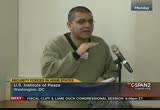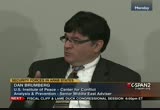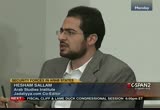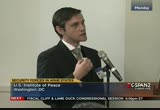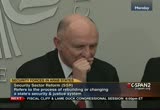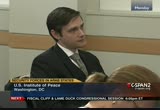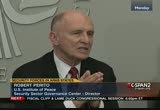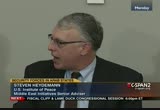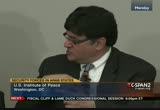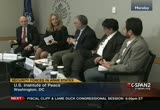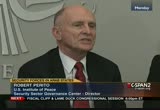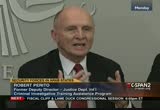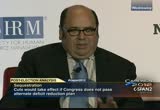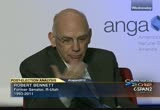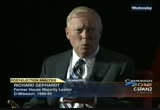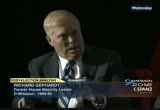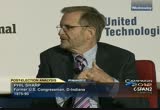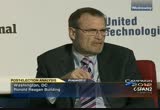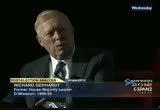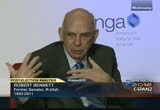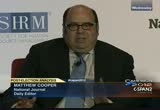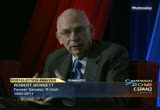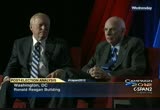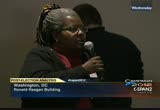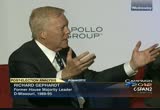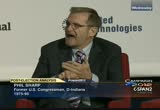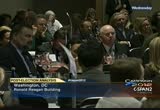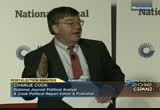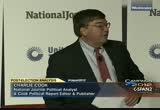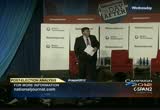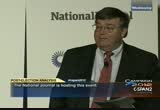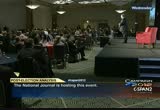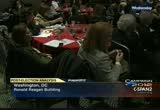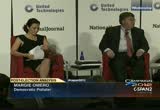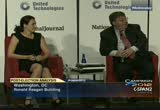tv U.S. Senate CSPAN November 8, 2012 5:00pm-8:00pm EST
5:00 pm
5:01 pm
bringing it under control bp and see is holding and other legitimate issues, up that will lead in other areas asking about transitional justice and reconciliation and feel they are not ready to give up unless there's a clear system of protection and a way forward. the targeting of militia without answering those questions will further erode the legitimacy of the tnc. it is important to get a legitimate debate because of this pressing issue and the final issue i would have that bob already mentioned, complexity of the security sector, needs to be reminded not only with an libya but the national community as well in managing expectations. there is so much that needs to be done. a lot of parallel practice needs to be taken, even in the best
5:02 pm
case scenario, quickly to emerge just the fact of building trust and confidence from the community in these institutions which for so long have been the reason for oppression and going to take a lot of time and my concern is in order to see results we may be putting a lot of pressure or short-term fixes to give more sustainability for a long-term solution. >> thank you very much, manal. what you were able to do in linking some of the current clashes to longer term issues around questions of state building and security sector reform is exactly what we needed to avoid seeing them as somehow manifestations of tensions and conflicts that arise with out any longer sense of their origins or how they fit into a broader process.
5:03 pm
what you were able to do was to underscore even though we often tend to think of this as one of the possible sources of resistance to security sector reform, they are also critical to the success of security sector reform and the absence of the state as a provider of public order in libya and that is a huge factor in producing many of these trends towards disenchantment and the legitimate nation of processes of political change that troubling for the longer-term trajectory of libya. that is a very useful thing to have on the table. thank you very much. thanks to the speakers who stuck so closely to time that we have almost a full hour for discussion which is really terrific and i will be taking questions. i want to ask our speakers briefly, a big question which is very briefly, you were fabulous
5:04 pm
in presenting us with diagnoses of issues. you talk a little about strategies. a bit more along those lines given the diagnosis that you each presented of the case in which you were working, just say briefly where you think the most promising opportunities might be for making progress dealing with the kinds of issues you and i like and because you did the overview will exempt you -- >> to go back to the theoretical discussions one basis to the steps in the concept, the first step is assessment and the second is strategic planning, it is appropriate we start here because we were taking and s s r
5:05 pm
classic s s r breach to these problems, and evaluation so that -- what is missing is this lack of assessments of strategic planning. when we were in tunisia we discovered a white paper for the transformation of the interior ministry which is the unique document and it was not available and we found somebody who had a copy and even when we came back -- the level of planning in libya is an effort to do planning for the ministry of defense but not ministry of the interior so the business of assessment and strategic planning is fundamental. >> the greatest potential opportunities are also in that part of the security sector,
5:06 pm
deeply troubled which would be the minister of interior. i think the fact that the police are afraid of operating tells us that they sense the rules of engagement for a standard operating procedures need to change but they don't have guidance or the protection -- they understand security is escalating, and their world is changing and -- interest in having those and a protest. that is one area where even the beginning of a dialogue before the constitution, quite a bit of guts but work that could be done between the ministry of interior or internal security part of the sector in tunisia. they have the initial assessment, a pretty solid assessment. if you looking at a state ike to
5:07 pm
nietzsche, what ought to be done about it, the government could do business in that setting. could perhaps revisit it in the context of the current situation that is developing and begin to think about to start implementing those but it is political and it is a slow process so the problem with having to talk to the population is manage expectations. to feel that this is something we accomplished is one of the things -- >> time may not be on the side of reformers. very quickly -- >> you talk about problems of sequencing. we mentioned a report that the catch-22 insecurity sector reform is unique security sector reform and you need security sector reform for democracy and how does it manage this paradox,
5:08 pm
this catch-22 is the central question. you can achieve everything quickly and if you go after the most forces you get tremendous resistance. we saw that in tunisia. what is true for both countries and to some extent libya even though -- push the democracy process forward because you can't move on deeper issues of security sector reform without reading the institutional and constitutional parameters for democracy and absent that, you won't get anything else and that is why the explanation within the islamic -- is so troubling. ultimately the issue of leadership is critical and how much influence the united states can have on the leadership issue is a debatable question. it will come down to the capacity of leaders in egypt and tunisia to push this forward and to overcome the increasing
5:09 pm
polarization. >> i will add to and dan's remarks and say in terms of technicalities and specific steps that need to be taken to reconfigure the domestic security establishment, they are all laid out there in a study that was put together by a group of civil society leaders as well as a group of meetings from the securities sector, commonly known as police for egypt. there's a great deal of debate within civil society about the exact concrete actionable step that needs to be taken in the short run and in the long run some of these steps when themselves to the type of changes that would require the liberation. this is one issue to keep in
5:10 pm
mind. the dialog's ideas are out there but what is missing as dan mentioned is the political will, the seriousness to engage in dialogue on this issue, even if they're not ready to adopt policy recommendations, there needs to be some kind of ongoing dialogue on these issues but at the same time i want to point out the issue of political will is important, there will always be a certain set of structural factors to limit the seriousness or willingness of egyptian leaders to engage this issue which once again goes back to put it in steven heydemann's terms of social fact between a state of society. if the state is not delivering on the demands of the revolution for greater social and economic rights, a social contract between the state and society is not formulated, the state of
5:11 pm
animosity between the state and egyptian authority and certain social groups in society will continue which will deepen the need for the apparatus inconsistent with democratic principles. >> thank you. >> there's a cliche that is one of the things where you are seeing a positive step embedded with it falls so the move toward transparency is a positive step in all the sessions, leading out in terms of the militia and rather than making what would happen behind closed doors a lot of agreement people are making political statements that only fuel the conflict rather than finding solutions. the price -- [inaudible] -- and
5:12 pm
sometimes that the cost of efficiency. the pitfall embedded in positive steps and finally the best example also what we find in benghazi when citizens are outraged by the militia that was there and in order to protest against the action, takes out the militia. concern of what presidents of being set at what cost. they have to step back and start to weigh in how to address those pitfalls that are embedded. >> thank you very much. we are going to turn to you for questions. this event is being taped by c-span which means we need to make it possible for the media to record your questions. we have a microphone on either side of the room. what i would ask is if you have
5:13 pm
a question you line up behind the microphone. i will move with full equality and democracy across and we have -- you want to ask a question. we have a gentleman who also did prior so we will simply move. if you wouldn't mind we can do it that way and proceed down the line. thank you very much. >> your colleague right behind you, i would like to reward that sort of enthusiasm so please identify yourself. >> i with the international stability operation association. >> can you hear the questions? you cannot. we lost your voice. i am sorry. go ahead. >> my question to all the panelists, what i'm interested in is how much actual influence
5:14 pm
does the united states have on this process of security sector reform on pushing the agenda, ideas in each of the countries. how much influence are we actually exercising? >> the question is about the extent of u.s. influence in each of the cases. why don't we reverse the order. what is your sense in libya and egypt and tunisia? >> it is quite high in terms of -- [inaudible] >> you are fading in and out. is it a microphone a shoe? is it the connection? >> is this more clear? >> that is good. >> in the case of libya the government clearly asked for assistance, they are looking for technical assistance and [inaudible] -- influence in terms of experience muslims learn from other countries.
5:15 pm
very important for sovereignty of libya and the population that the gnc made a decision and what we see particularly have been very clear that there's a need to support it. >> in addition, libya has resources that facilitate these relationships in ways that other countries might not. egypt one of the two. >> in the case of egypt we have a tremendously close enduring relationship with the security sector. that is political and financial relationship and there are levers. the debate is how to exercise those levers. my own sense, my personal opinion that the more they are exercised on the basis of quiet diplomacy in dialogue with security sectors, the more we can push this process forward but at the same time having a
5:16 pm
public discussion with egyptian leaders -- there are two discussions that have to be pursued at the same time and let me review something, in the case of egypt, important civil society, a stake in this and part of the dialogue. we need to maintain our relationship with them and the important thing you pointed out but is in the report is some of these groups include elements of the reformists within the security apparatus. we really need to focus on how to engage those potential reforms and identify them and increase their own leverage and not make decisions which undermine para leverage. those are the challenges. >> united states has a strong relationship in the case of egypt, particularly with the ministry of defence. many military officers have been educated in the united states through various programs. it is also interesting something
5:17 pm
that was not the case when we were in tunisia there is a donor coordination committee which was set up to a ward made various efforts in organizations. the e.u. has a presence and various european countries in different parts of the sector. there has been a lot of work -- the u.s. is engage as well. >> interesting to note that in the 90s we had several examples of massive united nations lead interventions where the u.n. moved in and established a presence in iraq and afghanistan. it was u.s. and nato lead. in the middle east and north africa particularly in these countries we are discussing something new is happening. in some respects the international community learning
5:18 pm
to do things differently. we are not going back to what we have done in the last 20 years. we are going to do it in a different way and has an international community we are learning what that process is and if you are on the ground you can see it. a lot of people -- there's a hesitancy about this intervention and this involvement that is quite telling and wasn't there in the past. >> thank you. >> i would like to know -- i am abigail woodward and i would like to know how women's rights are being protected and advanced and i would like to know if the muslim brotherhood has seen this debate impediment to that and how the constitutions are including them. >> let's start with the most significant case, constitutional issues and the role of the muslim brotherhood. egypt coming back from an extended period, what is your
5:19 pm
sense on that? >> i don't think egypt realized that, a new draft of the constitution with a lot of question marks with regard to the question of women's rights, some nullifications in there that are raising a lot of concerns, qualifications that say women's rights are protected under the constitution as long as it is consistent--paraphrasing here -- you are welcome to look at the actual -- this is a draft constitution that has not been ratified. you are welcome to look at that and make your own judgment. i want to clarify i don't think particularly on the question of women's rights and women's empowerment i don't think we should focus exclusively on islam discourse and the moslem brotherhood on this course, on women's right. this is not the only impediment even if it is an impediment.
5:20 pm
i don't think -- i also question the seriousness of a lot of political points on the question of women's right. people think women's rights are patriarchal and you should listen to what some have to say about this. i wouldn't say it is necessarily an islamist problem per se. the other issues the economy is very important. we tend to look at the question and focus on the question of cheri and women's rights which is an important aspect but also the economy is very important. a lot of economic issues and social economic problems that are concealed in economic terms but are fundamentally questions of women's rights and women's empowerment and talking about the problem of the informal sector and a considerable portion of the population that have no labor protection. the biggest people hurting the most from this reality are
5:21 pm
actually women. it is not exclusively a question of what cheri at --sharia has to offer. whether they have to say about the question of women's rights which is important aspect but not the only aspect. >> their security sector reform mentioned, we could get into that. let's do tunisia and libya and may have some broader observations on this issue because you have been working on egypt and libya as well. or did you have any -- >> in tunisia the issue of women's rights is a large issue. certainly tunisian have prided themselves on having had the most liberal laws regarding women's rights and tunisia has seen itself as the tunisian exception where there was a great deal of protection for secular and women as well.
5:22 pm
one of the issues driving this debate about how to find the tunisian state and the social contract, how is the role of women going to change as the transition happens? there was a great deal of in the press and you may have followed it over one of the positions of the constitution that defined women -- a fundamental shift from the way women have been defined in tunisian society where focusing on these issues. it is an important issue in tunisia. the bigger issues of how this new state society relationship is defined. >> to deal with issues -- >> can you lift your microphone a little bit closer? >> is it --
5:23 pm
>> we would love you completely. -- we have lost you completely. we are not getting audio. oh oh. okay. we will try to recover manal. >> strictly patriarchal system behind me. >> two things. it depends who is defining women's rights. not necessarily one group, we have different views of women's rights in different groups sandwich in the islamists and we have not mentioned stalinist this morning. the pressure from the ground has polarized the debate and making it more difficult for moderate islamists to come of the formula to address women's right and sector reform and a slew of issues in ways that will bridge the gap.
5:24 pm
that is a continuing challenge talking of patriarchal movements. they are quite explicit in their rejection of any kind of what we would consider modern democratic rights. >> frankly as we have seen in tunisia where the police force did include a significant number of women, the kinds of political transformations underway may as in cases in eastern europe produce a decline in female participation in the work force and the exclusion of women from some of the roles they had occupied previously. there is a whole range of dimensions in which this issue manifests itself. let's go to bill now if we can. thank you. >> i work for dime core international bodies to be director of peacekeeping in the state department. i want to second the things that are set by the panel in the importance of s s r, the first
5:25 pm
step after the peacekeepers have a temporary peace is to move to us as our to make the peace sustainable. i would like to ask about bob's question on the relative roles of the transitional government, international institutions such as the un, regional institutions like nato, e.u. would love to have the arab league more actively involved, the e.u. in africa and of individual governments who are trying to go in and assist the transitional governments into doing that specific capacity building in the ministries and among the police intelligence military forces. >> i think you have given us a question -- the role of all four of those critical actors in the process.
5:26 pm
perhaps we can convince how we respond but without doing it and in justice to the issues which are really very important in determining success or failure. >> just to take a piece of that and look at the response from the international community, one of the things that always happens is countries rush forward to invite small numbers of police from countries to come in libya there are five or six countries hosting police for training for providing training and something like that without any overall coordination is a situation where at the end of the day after training courses that are trained in totally different ways and have very little basis on which to talk to each other and ideas about how they should proceed on an immediate basis, and this whole
5:27 pm
lack of an overall overarching consensus planning apparatus impacts immediately particularly when you have countries rushing in to try these without a lot of thought. without indications what they're doing. anything to add to that? no? >> it is striking the lack of coordination or not so striking when you are on the ground and see the number of players trying to help and there's no overarching mechanism to structure their support and divide jobs of. this is critical because it is interrelated. to give you a quick example when we were in tunisia a group of lawyers were active putting the state to allow interrogation with basic reforms to the system but of course from the perspective of a police we got their information by torturing people if you have a large presence you need a mechanism to invest in crime and devastate culpability for crimes. the police and basic methodology
5:28 pm
of being police and investigations and so on is something interval to the reform of the system and so you would think you could identify clearly which country, which agency would be able to do that would make a huge difference very quickly in terms of the process but it is not clear who is going to be involved in this process. there are lots of pieces that need to be done more or less simultaneously. the question of who's doing what is a major challenge. >> you have to educate -- [talking over each other] >> would you identify these as issues who cut across the institutional levels that will last about international regional government, if we were to think of this from a the perspective of regionally, are these the kinds -- bob, your concern that action precedes thinking. is that characteristic
5:29 pm
across-the-board? >> is their regional institution that carries this forward? to we really have a regional institution? i am in the presence of regional expert so i will ask the question. is there a regional institution preparing this to step forward? >> the european union -- a number of european governments are focusing donor resources very heavily in support of ssr but they operate in waves that reflect the kind of approaches you characterize somewhat critically. they have an engage in a dramatically different way than the u.s. has in addressing these issues. >> what about arab institutions? >> i am not aware of an effective regional institution
5:30 pm
that has adopted security sector reform as a core priority. >> thanks. is this on? >> this is. >> the rand corporation doing a fair amount of work on this as well. just released a new report on libya's first year since gaddafi that makes the same points made here, a little involved in trying to prepare that report. a couple small differences. we were a little more interested in seeing nato maintain a role in libya. the question i have is if we think about models for process and end product of security sector reform, i would be interested to hear from the panel are there any models that the country should be looking to in each of these cases in the process and the end results? >> you want to take this? >> i don't think so.
5:31 pm
5:32 pm
in his eastern europe the country's largely had similar challenges you are facing very, very different challenges and the institutions from scratch. he and tunisia that is in the case. it is in the military. you are seeing these countries jury different challenges if we expand that out in places like syria you will see that in each of these cases there are significant differences and so finding a model that works is like people like to cite the eastern european case because it was unsuccessful. the problem there is consensus in the membership but help to drive that political will and raise the commitment of the government to undertake reforms. there isn't something parallel to that for the country like to
5:33 pm
tunisia. but they are looking as the cases of south korea and south africa and chile as examples of places that have undergone similar offer rotarian positions to a space rule which has given an emphasis on the internal to devotee. >> you know, i'm jury glad you mentioned those last few cases that may in fact hold some opportunities for learning because we have not integrated that possibility into the way in which we responded to the question. i would have underscored just how potentially significance the absence of prior model is for the securities sector reform in the arab world because it tells a great deal about the limited validity of what we think of as best practice in this field about the limited validity of what we often think about as lessons learned the art affordable across the cases from one instance to another putative
5:34 pm
we have to approach both of those starting points we have more skepticism in these cases than some others and we may be writing though will look all over again for these cases in ways that hold up significant challenges in trying to move these process these four were on the basis of expertise and experience that may be follow us and might have been assumed a couple of years ago when these transitions began. so there is a lot to think about in this notion that we may not have models and we should be aware of that. >> the project on middle east democracy. >> mary with the project. i wanted to ask about the sort of problem that is often perceived tension between reforming security forces and strengthening them and how this plays into the new political actors doing their own success
5:35 pm
including the electoral success for example in egypt the brotherhood may be reluctant to take on certain aspects of the reform essentially dealing with the military and privileges of the military but other areas for example police, basic police reform and abuses and the behavior of the police i think my question as the brotherhood would be how do you see this corrected and improved, but that there is a perception within the brotherhood and by the egyptian government institutions now that if you were to address these issues it would result in a short-term increase in crime and stability, and they feel as though they can either fight crime effectively or they can address these kind of concerns which would be useful in the long term, but detrimental in the short term. they would pay a heavy political price for the increase in crime and the basic security that would come with this reform. so if you could talk a little about that and also in tunisia,
5:36 pm
i was in tunisia a couple of weeks ago and one of the topics that came out of it was the attack on the u.s. embassy and while to those of us here that might obviously highlight the need for the reform i feel like to a lot of the actors the interpretation is very different, and to some the lesson is we need stronger security forces and some of the changes, some of the modest changes we like to use positive and destruction of reform over the past year are seen by some as a call for the week security forces in the college for instance like the embassy. >> the iron fist notes sallam want to jump in on this? >> sure. i mean, first of all i would sort of like to brackett the security sector reform and egypt to weaken the security service
5:37 pm
more than it already is simply because there have been various levels of reform. i don't see evidence of that. but also i would like to -- a little bit by saying the assumption that you are necessarily going after leaders inside of the security sector or security sector personnel through the process of reform i think is a misconception. it is a misconception because if you look for example at the cities for the initiatives proposed earlier and the stakeholders from within the security establishment include a lot of others that week and strengthen the position in the security service that gives some of the proposals to the spenders living on wages or for these personnel.
5:38 pm
they include the right of the egyptian police officers for greater rights and you have to keep in mind the absence of of this level of manpower and as a worker contributing to the environment of lending itself to the idea that we have been seeing in egypt lately previous practices by the egyptian police, for example the fact that a lot of the police officers have to be on a certain rank and have to be kept on contract securing full time permanent employment status with protection. this is one of the conditions that actually makes it much easier on the superiors and senior members of the security establishment to basically pressure them into taking on
5:39 pm
questionable activities. if you don't pull the trigger then i went toward contract by the end of this year because you are all on a contract and you are basically not protected. so i would just question the assumption that the securities sector reform is necessarily aimed at, you know, at disempowering the security to say that there are a lot of measures and reforms in the case of egypt the with strength in the status of the conditions and the working conditions and the egyptians. >> i think that when we talk about the security sector reform and that they are strengthening when we talk about strengthening are we talking about more weapons, more capabilities they can get out and so for example the argument being the balance in front of the embassy in the
5:40 pm
case of the police officers the brand new hires have come on board. for the example the tunisian case with a relative lack of confidence comes about with the element when we are authorized to use force and if we use force will be targeted for so all of that together created a situation for that particular event. but more broadly it is about an issue of competence. it is are they capable come to the of the rules of engagement, are they prepared and do they know they are authorized to do, or they protected, do they feel that the est. in the state that they are protecting? all of these things are very important, and that is where the security sector reform is essential because as you are reforming and rebuilding and restructuring the oversight
5:41 pm
accountability in these institutions, one has to also remember that you want these to be confident. there is a certain job they have to do to provide security, and another state of mind would be the police and the military. the military has to be able to do certain things. they have to be equipped to handle threats for security whether external or internal in the cases of the police. so yes, the accountability, oversight, but it is also the competency to be able to do the job, other secured and the population of the government in the case of the military security against the general threat. >> this is the question that comes up every time. it came up in the balkans and it's come up in iraq and afghanistan and it comes up again. this area of trade off between the authoritarian policing and democratic policing. many people set look if we go to the democratic policing they will become dropped and they won't be able to control the situation. but in fact, that is really not
5:42 pm
the case because the internal control in general is based on consent and to the extent they are brittle and anti-democratic and that they don't respect the population, you get than a lack of support from the public and in fact you get out when the opposition. >> i wrote a book on this topic called police in war and makes the point of the police are going to be really effective, they really only need to do two things. they need to be available, the need to be responsive and the need to be seen. if they do those three things it is less important than how technically skilled they are and how well they take a report or how well they use their weapons. if they can do -- if they can perform their duties in a way that attracts public support so the people in the society who supports the police and protect the police you are going to get real social reform, but the point that we make the book is the automatic response of the
5:43 pm
government's to violence is greater violence and this is something that we have to i think all kind of try to defend against. >> [inaudible] >> i do think that more important is the subculture which considers the physical violence in an attitude which is publishing kids and children and citizens. they consider this attitude as acceptable means to educate them on what they should do.
5:44 pm
i think that they are afflicted in the popular committees which stood on the street to protect, to make checkpoints and they are absent in that it was very clear it is a culture of the society. it's not about the institutional culture. so, my question after decades of militarizing it securitized in the public mind of the society to make it ready to accept this kind of practice, how the reform strategist may be able to address the public awareness of the public consciousness not
5:45 pm
just the institutional infrastructure. i think it is more important to reform. >> [inaudible] is your question suggesting that the public is largely viewed in the securitization of the police and the intelligence sources as acceptable? >> security is securitized in every single issue any means around us for the institutions
5:46 pm
it is not acceptable so the society protect the traditional traditions with this culture which starts from the families which they justify it especially in suburban areas where they are justified in the attitude to the citizens superiors to educate people and to teach people. >> let me take a crack at a very difficult question to read i think that your level of generalization may be from my perspective a little too wide. but having said that, i definitely think that in terms of the place i know very well that of course the authoritarian
5:47 pm
regime was accepted for some time using the av site threat for domestic threats as a kind of mechanism to sustain its rule and there are certainly many in society daughter still susceptible to that kind of appeal in the conditions of the growing insecurity, and how you would address this is a matter perhaps in the public education because in the state and the government would have to engage in a kind of human rights education to sort of to use a different view of these issues through the public schools and there's the political will to do that that is another question but i also thought that you were getting at the related issue of you would like education security apparatus itself. giving a different perspective on their role and how to go about it to read this the kind of challenge here and that this reason the whole issue that was talked about in terms of political will. but something that you may want
5:48 pm
to elaborate in terms of egypt itself and an interest in one. some i would just add i think that towards -- the securitizations and what aspects of the social life is a very important thing and i think you for mentioning that. it's also partly institutional. one thing to remember is that it wasn't a long time ago when the security was basically involved in almost every aspect of, you know, every public and in some cases a lot of private institutions if you have to get a promotion at the university you basically have to go or you had to get some kind of an approval as a person signing off you have to get some kind of an approval from an office within an industry of interior organizations that is a security investigation service which still exists until this day.
5:49 pm
but also i thank you for bringing our attention to the fact and what of this is about changing the securities sector to a very high level of policy discussion, but there are, you know, they're has been some really good work that has started and has taken up and it just is led by the egyptian civil society organizations, for civil which also features the involvement of the professor from the university of california. working with local communities to rethink and refrain the perception and understanding of, you know, neighborhood security and human security so there are a lot of bottom-up approaches to changing the perception and changing the securities sector and you see some of these
5:50 pm
efforts happening in addition to the high level policies of that we have been discussing such as the police for egypt. >> thank you, hesham. i don't know if you have anything. okay let's take this final question and then i have one more very last question to pose to the panel before we close. >> good morning. my name is jason come independent researcher and consultant on issues mainly around policing conflict. so, my question is aimed primarily at bob and i will we get a little bit four tunisia. you know, he mentioned his paper and highlighted the problems and the challenges in libya and with a light footprint. not a kosovo or afghanistan or the iraq model where we have thousands of content and hundreds of thousands of people on the ground to be able to sort of pushed the democratization and the ssr forward.
5:51 pm
what is the post conflict ssor what can we do in the conflict to set the stage posed conflict to the will to get on the ground with her or not it is a footprint or heavier footprint some consideration of that made them for egypt and speak of, you know, if you are looking at the eastern european model was best as you can take in best practices, how do you -- which of course may not be the case -- how do you modify that with the fact that there are thousands or hundreds of europeans or americans on the ground that sort of help drive this forward, what is the possibility of success without that very present motivation to do so? thank you. >> this is an interesting question. thank you very much. they just sit there and the [inaudible]
5:52 pm
know, i was thinking about the mentioning of south africa as a model. i was doing south african affairs at the end of the transition and this experience with the russians there who helped them and offer some solutions in the south african government basically they couldn't deal with the advice they were given and they couldn't make judgments as to which was the best and so they ended up not doing anything. which is maybe the problem here. it's very hard to see. a situation like libya, and i will just give you an example, we are meeting with a person that is in charge of the procurement and donor assistance for the libyan foreign ministry, and after that conversation and the brigadier general what do you need? i need somebody that understands the personnel database. let me explain that i have 300,000 people on the roles of this ministry, and i have no idea who these people are, and
5:53 pm
you know, the old regimes have thousands, tens of thousands of people because they just wanted people to get a paycheck that they've been in the field industries so we have people that may be policing 40,000 names but we don't know. maybe 15 of those actually show up for work, but who knows who these people are and then the 80 tons of people that just signed up in the previous. you can see they are on the second floor having a great time and which don't know who they are either. what i need is somebody that stands on the personnel database is and we need to find out who i have on my role. that's where i need to start and so that is a good answer but it is an answer of the realities are. people who do ssor i think globally understand the context
5:54 pm
but work for a place where you can actually have access in this case in libya in the west try to help this man sort out this amazing problem. if you do that than you can get everything else. >> anything quite on this? >> okay so the final question. november 5th we have an election coming up. looking beyond the election we are also approaching the season in which one of the most prominent rituals associated begins and that is inviting experts to make predictions about where we will be at the end of the coming year, not legal but 2013. this is often done with respect to where we can anticipate the accuracy rate of the predictions are that is all so we have to be careful out how we will hold our
5:55 pm
predictors to the accuracy of their projection. but given everything that we have discussed about where these processes are headed above the obstacles and about the possibilities for intervention about the degree of influence outside doctors might have. if you have to speculate in an informed way about where you think we will be with respect to the security sector reform in egypt and tunisia in particular we will set libya aside. give me a sense of where do you think we will be? >> that is a tremendous cost and i feel like i am on a sunday morning talk show. i think for me i think where the process these are going and i
5:56 pm
concur egypt and tunisia and in some sense there is a kind of conversion going on. i can see the breakdown in tunisia for the domestic violence and this process coming to a halt. in the case of egypt, the great asset as well as liabilities of the authoritarian system and the numerous kinds of power in the budgeting process and that checking process has been a hindrance. we predict the possibility to bring down tunisia and the possibility of slow growth and success in egypt. >> just to push that a little bit further another word on egypt and tunisia what does the breakdown mean, what does it look like in tunisia? >> it can look like a violent episode that compels the
5:57 pm
government to look at the security apparatus as an element to provide direct sort of much more direct involvement in politics. it's a very tough question. cynics, the potential reemergence of the security state are there conditions of declining? okay. i guess there is a tradition here in washington, d.c. whenever anyone is asked about the position they always make one of those predictions like the next 18 months are going to be really critical along those lines. but i'm way to do something very similar. 36 months actually -- 35. >> [inaudible] what i'm going to say is one thing our discussion has alluded to is the presidency in egypt and a variety of bureaucratic interests not just the military with a deep state is going to be very critical. the question of whether morsi is
5:58 pm
going to what the state or whether they will coopt him is planned to be extremely important. but i would also like to say this not just a question of sort of that confrontation that we have been waiting for it in the president and between the various your critics and the state's particularly the military and the security service but we are also looking at the relationship to the president and the guided bureau but there is sufficient room for tension between the two sides is essentially where an independent presidency could emerge. i think if that happens someday that is a new ball game in a situation in which you could have and the egyptian presidency that truly has some wiggle room to represent and to respond positive to the popular pressure for the transfer of the change in the security and elsewhere
5:59 pm
>> it is in fact the case. i think the next eight to ten months will give us a better sense of the protection is optimistic take to hold. >> it's not a prediction it's just a -- >> to see what scenario will hold. in the next eight to ten months or so we are going to find out what the constitution looks like and will be the first election held in the second set of elections where we don't have a caretaker government any more but we have a real government for to tunisia and that will talk a bit more of those are going to be enormous accomplishments in the election and the creation of a constitution which provides the legal framework and what can seriously begin to think about reform. in terms of the violence and the
6:00 pm
the date and the moderate and secularists, a lot will determine how these elections are if progress comes. i think -- i was talking to someone in tunisia recently and i focus on how are you feeling about the security context because what we are seeing in the press reports are the daily incidents of silence now between the police in which the protesters and police have been killed or injured. my biggest concern right now is a traffic accident. that is the only thing i really worry about in tunisia. other than what life is continuing as it normally does. and that is the perspective where i find interesting is here is someone that was involved in the securities sector reform and engaged in these ministries that have a vision of it that is probably different than those of us here who very much that the sense that his biggest concern in terms of security is the traffic accident and it is
6:01 pm
6:02 pm
countries is really important are going to be saying that because we've gone through a year of very rocky times in which there's a test of strength to take place between the forces in each of these societies, which are now beginning to emerge. in the three of us are four of us were traveling together a couple times, i think we all came back overly a domestic about the potential here. we were so struck with the talent and spirit of the people and the resources and feeling of optimism that we saw and i think we've overlooked the fact that the argument is over and now it's been formed. so it's going to get a little bit worse before it gets better. by the end of the day, we may be in a process where we will have an effect, in place legitimate authorities we can go to say okay, now it's time to begin reform.
6:03 pm
they will say yes it is. and let me tell you what we want to do first. >> i think those are really helpful set of concluding comments. thank you very much for your contributions. thank you all of you for joining us. around us applause, please. [applause] >> i want my fiction to be intensely journalistic, intensely journalistic because unless you get out and look at what's going on, these days you're going to miss the things influencing yourself and everybody else.
6:04 pm
>> yesterday, the national journal has a comprehensive look at the 2012 election results, the impact on congress and executive branch, k street and policy for the next four years. panelists included national journal political staff, pollsters, lobbyist and former congressional leaders. up next, former utah senator, robert bennett, former representative set of six and phil sharpe discuss what lies ahead for the president and congress as they try to tackle the fiscal cliff during the lame-duck session. and following that panel, notable political analyst charlie cook is joined by two pollsters to examine the many polls and surveys prior to and after election day. >> so i will launch rate in. they spent a huge amount of discussion last night and this morning about andy.
6:05 pm
who has mandate, who doesn't have mandates. but when it comes to the fiscal cliff, the more important question is really who has leverage. and i am wondering if the democrats are convinced that they have leverage because they want to jump off the fiscal cliff if it comes to that and let the tax rates go up. do you think that they actually do have this much leverage as they think they have? >> with that's a good question. my backup to second. it's kind of amazing that we are back with president obama. the senate has got basically the same contribution. we kind of ended up right back where we started. so i think you've got to give more of a niche to the president because he got reelected. second, the bush tax cuts are due to expire. that's the big leverage. they are going away. if you want to keep them coming
6:06 pm
back to decent team. if you can't do an agreement, they'll go away. look, i don't know how damascus going to play out. if i had to guess, i think they'll use duct tape and chicken wire and kleenex to get through the next few weeks if they can get a grand bargain between escaping and christmas shopping. but i don't think it's gone since the president mentioned taxes unless i do i'll be very curious to your congress men said they test to say about that being so intimately involved in the 1986 reforms. i think where we are heading is, you know, kind of kicking the can down the road for a while and then a boat push for tax reform. can you get there? i don't know. it was a tough call in 1996. it's tougher now for about a reason that the fiscal issues themselves and composition of
6:07 pm
congress. tax reform to get the additional revenue without dramatically hugging raid and no one is inclined to do it. that's a long answer. it's going to be a long process. >> do you agree? >> yeah, that doesn't mean it's going to happen. i've lived through two lame ducks in a control change. the one after the election, one controlled the senate senate not by election, by different defection and the republicans win it back and we had that lame-duck. and then the lame-duck with the democrat came in in 2006 and that was an election mandate. in both instances, while at the
6:08 pm
house members talk about the house, the speaking of the senate, and both in and saved the senate leader prior to the lame-duck in one case daschle and the edgar cayce frisk had a whole agenda in the lame-duck. we can't get this done before the election, but after the election we can work all this out. and the impact of seeing control change as a result of the lame-duck one about the challenges. tom daschle couldn't get anything done that he wanted. the republicans are going to be charge. we set absolutely not. ,. , was frankly the house republicans who said we are wiped out. we're going to pass a consumer solution and go home. he said but wait a minute, no,
6:09 pm
we're going home, buy. there is nothing you could do about it. so the question is what is the psychology of this election going to do to the best sleep plan of harry reid and speaker boehner? i don't think any of them expect that what you just described. there's just no change. the great surprises that there was no surprise. and i don't mix at the lame-duck to do very much worthwhile. i think they're going to pass a continuing resolution. they do have the fiscal cliff that they have to deal with and there will be a calibration of who gets the most if we'll thought the economy took over the cliff. i think it is not as don, who gets blamed? only thing the republicans now,
6:10 pm
the democrats won the election. the voters aren't always rational in the way they hand out lame. there's a lot of calculation going on right now at leadership levels in both houses and the white house has been a huge of relief that the polls were right, but now are stuck with this for four more years and how do we do with this. i don't think anybody knows how the lame-duck it's really going to work other than will be a continuing resolution. what do you kick the can down the road kind of resolution. the question is, how many rings will be added to that train as it's moving through and what shape with ap and that appeared of great uncertainty. >> congressman gephardt, as senator bennett just laid out, this could get messy, even if they come up with some solution
6:11 pm
that involves duct tape and kleenex. does not affect the leverage for the president quite does he really want to start his second term with an economy authority fragile at risk of going into another recession? >> well, lame-duck sessions are always lame and they use that word for a good reason. there's two problems that lame-duck sessions. number one, there's no time. number two, everybody's either angry or related or just exhausted. so it's hard to get people's attention and to get the effort that you need from 535 people to come up with some big agreement. so i'm very skeptical that they can do any big deal. if i had to predict, i'd say one
6:12 pm
or two outcomes are the most possible. one is to kick the can down the alley. in other words, unwind the sequestration for some short period of time, three months, two months, six months, whatever. in the same with the tax code so that you would just suspend getting rid of the tax code to keep the economy moving in the right direction. the other possibility, which is harder, but may be possible is a mini deal, where you suspend a certain amount of the sequestration on both the defense and the domestic side and you find some revenue raisers of some kind to pay for that. so it gets much harder because you get into office questions of what is going to be sequestered
6:13 pm
and what's not going to be sequestered and how to make it revenue. but let me go to your first question. leveraging mandates. when you talk about big fiscal issues of the kind were talking about here, my view is that nobody has a mandate and nobody has leverage. there is nothing good in any of this politically. that's what you have to understand is that from a politician standpoint, a member of congress in either party at the end of the day, they really don't want to vote for any of this staff because it's all bad. it's all pain, it's all toxic. it's poison took up programs are based tax is there even do tax reform. let's go back to 1986. we do tax reform that we've are
6:14 pm
purposely being revenue neutral, which means we were going to pick up any more revenues. but in the process of broadening the base and lowering the rate, you're taking tax breaks away from some people to give lower tax rates to everybody. that is not a happy political exercise because the people who've lost the tax breaks are angry forever. they never forgive you. so there is nothing good in this. this is all bad. so whenever they get down to trying to do a good deal and i hope they do for all the obvious reasons. it's going to take a high act of patriotism on the part of republicans and democrats to get the necessary boat to get this through because they're going to have to cut spending, cut entitlement and raise taxes in
6:15 pm
some way. and that will be political themed beyond your belief. and they're going to have to give numbers in some cases to give up their political career to vote for this thing. that they need to pass. >> congressman sharp, the opening on both sides indicate that each sides if they have leverage and john boehner said earlier this week that he sees no need to raise taxes on upper income households and that would be bad for small businesses and showed no indication of a willingness to compromise. well, he needs to compromise ultimately on that issue. >> first of all, anything said prior to yesterday think which start with a big discount rate with anybody at any level that most americans have discounted them totally. that's the politicians must worry about is the massive
6:16 pm
discounting that's gone on in this country about washington and elected leadership and the need for people to restore themselves. and also i believe it's not typical but after election was an upsurge. lots of intelligent people in congress. but whether they collectively behave that way is not obvious. >> short-lived. >> short-lived, exactly. but the important thing here, and a little more positive because i don't doubt the hurdles that's been discussed and i doubt there will certainly be deal in a lame duck, but i think it is such on the economy that there will need to be some indication that this is going to be solved. and so, they'll have to find at least a minimum resolution on paper that they're going to resolve it. don't forget the good things that happened to set it up you can avoid decision-making
6:17 pm
released without major consequences. so if you like military spending, you're screwed if you don't do something. and this is a good position to get the congressman. you have to get the document to a corner and that's if they manage to do on these issues could remember this, if we get past january 1st, pitcher to solve this kicks than what the costs and increases in taxes and everything like that. what position are you and then as a representative of the senator? you are in a brand-new world in which you can at least go back to your friends who said i was part of keeping the tax rate very low. now i'm going to be able to restore the tax rate. you're in a different position. i'm going to restore the expenditures that went off the table. i'm going to restore tax cuts. not as much as he wanted, not as much as i promised you, but now i'm in a different position.
6:18 pm
i hope that gives you a little more hope that she'll find a way through this. the larger hope is the american people have had a two-year in both parties in the various factions are we really have have to take that into account. the great thing that happened at the debt ceiling, which is awful for the economy, but the great thing that happened was the fact that every faction lost all stunned. none could rocklin tell their followers can we did the right thing. america is ready to us. america wasn't ready to follow in the fall on the basis of that vote. for some people will still be where they are, but a lot of people won't. i think the most important thing is we keep it in the calculation of how many democrats and republicans. elections don't only change the people in office, but they also change the minds of people who get reelected. it doesn't mean they become
6:19 pm
something new and different, but i'll bet you a lot of those freshmen republicans will be differently. i came in as a freshman democrat and we were sure we could talk in washington or reform it and everything else and pretty soon we were part of the problem. but the point being that everybody learns in the process. and as i learned from a southern colleagues a good expression of certain issues now come under that rubric that dog won't hunt. the certain issues will go off the table, although rhetorically still there for the beast on that thing. what the republican congress is not going to have those on taking money away from the opposite kind of thing. -- it's not going to happen. >> you have to imagine a lot of
6:20 pm
soul-searching at the white house about how to approach this differently from how the white house approached the debt limit standoff in 2011. what do you think they will do differently and what do you think they need to do differently? >> well, i hope they will engage more members over a longer period of time. and so i need to give you an anecdote to kind of mix lane. so when george bush the first one to have a budget summit in 1990, he kept calling we need to hold a summit. anything but taxes. i give a speech in houston when it got nominated. i said we'd met with, no new taxes. and we send, we're not coming. everything is got to be on the
6:21 pm
table. this went on three of four meetings. finally said yes, recalling to pay taxes on the table. i get the joke. he had a press release them i walked out of the white house, he was standing next to me, waiting for the cars to come up and went to deferred. i said mr. president, what's wrong? he knew the political risk he was taking. leadership is taking on the other side. that's what he was doing by doing that. i think he lost the election, but who knows. that's leadership. so then we went from not for about six months of negotiating. not just at the leaders and the white house, but about 120
6:22 pm
members to get out of committee share, on the ranking members. what you have to understand if anybody can say were going to cut medicare by acts. the question is not which are going to codify. the question is how are you going to change the program to get the savings? and so, you need the committees which do the work in congress to really get down to the brass tacks of what does it mean to cut ex-program via why? so we went through all of that and we still didn't have an agreement. and so i said to tom foley and george mitchell, we've got to get people off campus because the press is coming up in saint senator bennett and we are you going to cut medicare. so we took into andrews air force base for a week, day and
6:23 pm
night, had 120 members, the omb group, the white house staff that went over all of these things, finally cobbled together an agreement. i had to eat a hot or send every night with bob dole. but so far this went. and we came out on the floor and argued it for a week on the floor and we lost. we lost. that's how hard this is to do. and since then, we've tweaked it a little less or we could pick up a few more democratic votes and i finally got it passed. that was a minor amount of money compared to what they need to do. so i guess my advice to any white house in any leadership is
6:24 pm
you've got to do is 535 people. you can't make a deal with the four leaders. they got for both. you need a lot more votes. you need probably 60 in the senate. so you've got to include all of those numbers in the intellectual process of what it actually means to do what you're doing. so they take ownership. the last thing i'd say is when you watch the deficit commission do its work, i think tom coburn is a good example. probably when he started that process, he wasn't for a lot of things. but by the end of that, he became a will advocate for doing this for the good of the country and that's where you need to
6:25 pm
bring enough people to get it done. >> first of all, the white house that obviously has more experience. jack lewis head of omb, that disengages the deal. she's got to have in place that kind of staffing in order to even have a chance. now, since the bulls and rivlin domenici have led to adapt those proposals, but in the fact they've shown a path forward, been widely discussed in cert was in this country and many people, including the president and others who did not endorse, but kept in the campaign referring to a path of my work and was criticized by critics for not having taken that course. that has laid a foundation for making is never going to be easy, but makes it a foundation on which we can build now.
6:26 pm
in a sense you have to do that. that's part of the intellectual groundwork that you take individual members serve. congress hasn't got there and that's going to take some work. but it gives a basis on which you can again to build some pain. >> senator bennett, in terms of the process up, congressman gephardt makes an interesting point about needing to andrews air force base and in the debt limit socket, there is talk of bringing everybody together at camp david or something like that. neither the president nor john boehner went dizzy and sick about that idea. what happened instead were these meetings, one-on-one readings between the president and john honor and eventually meeting that involved cantor as well. should there be enough for some kind of broader meeting, a summit of some kind that brings all the stakeholders to the table? >> certainly there should. whether it fits the pattern for
6:27 pm
86 were brand-new and to be created. i think the president ought to be having some long conversations with themselves as to how he does that. i hope the president has read the book the price of politics. i teach at the hickory institute of politics at the university of utah, all of whom are lanky eyed, idealistic, some republicans, some democrat from the kindest thing you get out of very bright college students. i wanted the reality of just how difficult it really is. the woodward book does not come off well on the woodward book is the president of the united states. not because he is a socialist type that all the republicans claim years. i got to know him in the senate and i never found that out until
6:28 pm
after rush limbaugh informed me. [laughter] he was not willing or from his experience base, not capable on the kind of get in the weeds come and make this thing work sort of work. he was still a college professor, university of chicago and said let's talk this through. this process does not work this way. the earlier panel talked about all of the republicans only listen to fox news and democrats only listen to me. he only listens to david axelrod and from emmanuelle in the beginning. i hope esr and by virtue of this
6:29 pm
campaign, yeah, you one and that great, but if you're going to govern from a fight listen to people with credentials other than those you can put upon them. you've got to give those people a place at the table. i would even go so far as to say yes, in addition to the kindest thing talk about here by widening the base among members of congress, you ought to have some people outside of congress, sitting at the table at the summit. a conservative economist, liberal comments leaves paul krugman out because he's basically a voice for the democratic national committee. the find some people who are thoughtful, who say these are the real consequences of what happens if you don't do anything
6:30 pm
we are the bipartisan policy center. during the last thing we put together, bbc put together a report if the debt ceiling were not raised them and took it on the hill and handed it to the members of the tea party. it was not a partisan effort, but many of them look at us and said we had no idea. we didn't understand and are not going to believe the president of the united states he tells them to submit it can't find because they'll say that is very political person fischer talking to. but wind my god. so he's the president he's the president of the united states. he has a competing power that no one else on the planet has and i would say to him, you have got to spread the number of
6:31 pm
opportunities for people to sit at the table. and i say, mr. president, you can give them some credibility here beyond just those have been elected. >> matt cooper, but listen to president obama learned from past presidents, including president clinton on how to approach it from the strategy of? >> well, it's a good push in. i think leader gephardt had a good point about the model for george bush and then senator bennett acord about getting people in the room. obviously you appoint to the positions makes a difference. if you have erskine bowles, that would probably give you a bit of a head start. jack lugar. you have players in the key positions who are well respected on the other side of the aisle. i think you also -- you have to know how to manage a and you
6:32 pm
could have a t.a.r.p. moments coming up. you recall during the financial crisis the tart rescue package failed on the first go round and the stock market continued its precipitous falloff of the sand cliffs. it's possibly a something like that coming up soon. the bond yields are low at the start of this in congress work it out. if you feature back up a wall, you how to manage a crisis. president george w. bush did well in finally getting tired. >> congressman sharp, there aren't a lot of issues on the table here and what all of the panelists are talking about was a partial solution. is there a substantial risk that some of these things that get
6:33 pm
done every year come the tax extenders, a&p, those things don't get done because it's too difficult to do all of us in such a short period of time. >> there's a high probability that it will get done. however, that is part of what you set up with the expectation that this is a high agenda item. you have to get to this in the next four to six months. that is a different proposition nothing that would guarantee that. i do think that is more likely where we will be. you have to remember this is not a cliff in the sense that in january all of this money is withdrawn from the economy and delay. it's over several years that its payouts and bringing in a dollar doesn't happen. so technically it's not a cliff. it is a decisional cluster will have an impact on people's planning and their lives.
6:34 pm
there is that opportunity to stretch that out. if you don't dissent in the fall, you have to do some paint before people get in to pay their full share of taxes unless you think you can get away or not. >> the debt ceiling is a class that will get us right back in think. >> are there problems to trying to do at this retroactively? go home and say our differences are too great. let's found this to the end of the year. then they try to do it retroactively. americans are wondering other taxes will go out. are there huge risks that? >> there are some technical
6:35 pm
problems in extending the tax cuts three months, six months withholding tables on a lot of things have to go on. but i think the likelihood is still as well as sad this thing gets kicked down the alley. things will proceed. there is one risk worth mentioning here that i thought a little bit about. i don't what happened, but in this case could have been. to kick the can down the alley or to get a small deal, you've got to have the acquiescence of the minority in the senate and the majority in the house. you are going to hear, i think, some history over the next couple of weeks with democrats
6:36 pm
saying, let's let the tax cuts go away. we need to teach people what we care about. for not going to cut domestic programs. you are going to some republicans saying, let's go over the cliff. lets come of these programs. but people understand what we are facing. i've heard some of them say that the teacher the credit card. that's what i came here to do. that's what i want to do. now if it looks like that's happening still assault that come with the money his anointed extent of the economy at once. but you could have a couple of really bad days on wall street. the market may drop by a thousand, 2000. it was just one bad day in the market got them back to town to
6:37 pm
get t.a.r.p. done. if that happens, there's some risk that could happen. i think the market would react badly and then we would see what would happen. the next senator bennett, who is in the administration do you think will emerge as the key players. you know, not talked about jack lew. there is also vice president biden who played a big role and ultimately resolve in the debt limit standoff and secretary draper will be around at least through the lame-duck. >> i have nothing really to add on that. you've got away. biden is the one member of the administration who understands the need is to go to god. he called me and i was still there is some of the lamest of
6:38 pm
ducks. she called me and we discussed it and stayed in touch during the whole thing and basically that was worked out one-on-one, biden to mcconnell. two people who know each other, trust each other come a couple of grown-ups got it done and i don't see this lame-duck been too much different. >> there's another member of the administration his been through all these awards. 1990 and in the clinton administration and that's leon panetta who is now on defense, but really understands the budget deeply in all parts. so could be another one to really help. >> and another member of congress. but some of the problems the obama administrations have. to use a term not in the derogatory sense because it came to me from the democrat.
6:39 pm
he said the president was a drive-by senator. he was in a real sender coming as a drive by by senator. came long after pic pick up his paycheck and then became president. tonight it was in the house long enough to understand. biden for 36 years and they did not have a congressional relation to have the kind of institutional memory. now they be forced to get some institutional memory by all of the scar tissue they've acquired over the last little while. >> great. i like to go to the audience question now. >> hi, thanks so much for a great presentation. wondered how hurricane sandy and the possible need for fema to
6:40 pm
get emergency supplemental aid will impact on the lame-duck and if you could talk a little bit about that and if you think the cr that goes through march now will be voted into that to be finished out for the year. >> let me talk about that because i wasn't appropriator. the preparation process is not only broken down, it's jut down. as a consequence, all of the recent decisions are made with respect to the cr. the cr ultimately is written to the leader's office. so those decisions will not be made in the lame-duck by majorities on either side. it will be made by harry reid on the senate side and neither agreed to or acquiesced in by john boehner on the house side. it's the worst rate in
6:41 pm
appropriate is to put it on the hands of one man, two men in this case. i can't give you any guidance on that. talk to john boehner and see what he agreed to. there would be no logical appropriations process with respect to these issues. >> banks. i was wondering who would be among the first of the cabinet secretaries that will be asked to leave the administration. [laughter] >> i will defer to my democratic colleagues. i have some nominations. i don't know what the plan is. usually in most administrations, people kind of offer their
6:42 pm
resignation and let the president figure out if there's any of them they really got to hang onto. my sense is a lot of the folks have already said they are leaving, so that probably will take place. but that's all i know. >> just to follow-up on that note, given the fiscal cliff and everything going on in the certainty, is there a need to provide some clarity at least on a treasury secretary appointment sooner rather than later. [inaudible] >> how soon, though? >> tomorrow. >> the markets kind of out right now. >> you have to remember the market will now understand on washington you cannot count on washington for the general philosophy. and so, they are not sitting
6:43 pm
mayor. that doesn't mean it's not serious, but it just means they are not. their expectations like most americans are pretty darn low at the moment. >> leon, peace for public. based on your experience in the congress, d.c. an opportunity for tax reform in the next congress in terms of lighting up ducks and getting everything in place to have something move during this very next upcoming congress? >> well, it's a really good question. obviously it could be part of a grand bargain because it could be the vehicle to provide some revenues as part of the overall solution, whatever ratio tears looking for and spending cuts as
6:44 pm
opposed to revenue. the worry as i said a minute ago, even when we did it in 1986 and it was revenue natural, it is very hard to do. i mean, exceedingly hard to do because you are taking on the lobby, all the interest that is gotten something in the code that helps them. we started with the bill on this and ronald reagan picked it up and really carried a pair we got it done in a bipartisan way. when we did our original bill, we took out the mortgage deduction. we took out the charitable deduction. we took out everything. it was pristine. it was 10, 15, 25 was the top
6:45 pm
rate and we thought of as an elegant bill and it was. it just couldn't pass politically. so we had all the real estate people and all the mortgage bankers and everybody came to town and cities get rid of the mortgage interest deduction at the end of the world. so you lost. on the university president and all the other charities came and said you can't get rid of that. the only thing we hung onto the state and local income tax. how we hung onto that i'll never know. and in the end, we were able to lure individual rate by taking more money from the corporate guy, which i don't think you can do now. everyone says the corporate rate is too high in america. to be competitive with guy to get it done. this is going to be really difficult exercise. if you're combining it with cutting entitlements and defend
6:46 pm
another domestic programs to get the budget passed, even it's over a ten-year period, which it probably needs to be, i just think it's a bridge too far. but maybe i'm wrong. i hope i am wrong. and it could be, if they really get ambitious and they've got people intellectually into this thing, it could be an important part of a grand bargain. >> one of the most important things here as what is the attitude of washington and elsewhere over where this economy is quite an outcome as some people have argued were just an aesthetic level, but. there's what says we are at a different place in our history on this economy with guy to take much more seriously the allocation of our resources and the impact of the type code on investment and consumption in this country for going to have a
6:47 pm
vibrant economy. and that argument traipsing, that would leave you to begin to take this much more seriously about a tax reform. now that beyond what makes this thing harder is so i think you're absolutely right are not going to get rate reduction and get rid of all the deductions as a way to pay for it. so one. it's under discussion in some circles with a nod of analysis on it, but it's a carbon tax, which you would think would not have a prayer kind of proposition . but it enabled factions in the congress and elsewhere to get other things they want as important. it may be that you could start something modestly that grows over time and in a sense kill two birds with one stone. of course you might get killed in the process.
6:48 pm
>> i think phil is right. which you always look forward is the least worst alternative and something like that may provide that. you wouldn't think that would ever see the light of day. but as part of again getting rid of the big problem, you can include may be something like that. the thing you have to remember is if you're going to get a big compromise at the end of it, everybody has to be completely angry, completely angry and hate video completely. you can get the votes for her. >> well, on that note -- [laughter] time to wrap a kid i went to thank all of you for the interesting discussion and i think we're headed into a very interesting time.
6:49 pm
[applause] >> how could i not like technology? i am a fat guy who prefers elevators and escalators. i feel hot air for a living and i fly way too much for the engines and despite the helicopters sunday. if i look like you know what, then you're right. your eyes are not deceiving you. i got about two and half hours of sleep and cut this 7:00 train down to new york was jennifer duffy is able to watch the senate and house editors on the decision desk at nbc, which is a fascinating place was about 50 people in the room and about two thirds of them are statisticians and look like eight models on each race. so in other words, each of the 50 states presidential, each senate race in each governor's race looking at lake nasser meets politics. and were sort of the
6:50 pm
nonquantitative people that because we watched the race year in and year out is sort of the hey, does this make sense type thing. so for someone his s.a.t. score was significantly lower than my verbal, it's really cool for me to be in the room. but anyway, it's a lot of fun and we were very pleased and had a really good evening. but it's been a lot of fun to do that with nbc. but if my eye looks great, i developed this site in and my right eyelid two days ago. you know, i guess probably just getting worn out and stuff and not having nicely. anyway, i apologize for all that. let's talk about what happened. this is the first time that obviously said anything comes of this is somewhat disjointed. but on the presidential, this thing kind of played out a lot like what we kind of thought.
6:51 pm
i mean, my process is sort of watching the evolution of what romney needed to do to start off with a 22 states that mccain won with 180 electoral votes. and many say okay, now he's obviously going to win indiana. so that gets to 191 and then probably the next easiest state would be north carolina. and then, what would he have to do after that to get up to 270? you know, we still have two states still out, florida, virginia, which were going to be my next two states he would need to win and they are still undecided at this point. with obama slightly ahead in both of them. basically it looks like it stopped. but he would've needed to do florida and virginia and then would need to get into colorado, iowa, new hampshire and still even winning all of that was going to be pretty short to 70.
6:52 pm
so it was pretty clear, you know, going into election day that away, a whole lot had to have been right for romney to get over the 270 and it just didn't happen. it just seemed to peter out either after north carolina and a sequencer may be either florida or virginia once all the votes had counted or theoretically both probably not. that's theretofore applies. and there was one point back around just looking at the sequencing of it. romney was clearly dead in the water, just not moving. he was that far behind before the first debate. it looks like a really hard three to five points. and you got a sense and i had a chance to look at what wal-mart
6:53 pm
moms focus groups and focus groups that peter hart does at the university of pennsylvania university of pennsylvania that he sent around the country some others. i got the distinct impression that a lot of the undecided that were out there, they were enormously dissolution, disappointed and president obama. they clearly didn't want to vote for in, but they didn't seem to be as curious. some of them didn't seem to be really hope the money considering romney. they sort of didn't want to vote for one guy, but they were paying that much attention. he didn't get the impression they were really paying attention. i think he was dead in the water. first debate, romney did well. the president show up. i love jay leno sign that the only people that the president won the first debate with the nfl replacement reps. that seemed to just absolutely nail it.
6:54 pm
he got a really nice surge off that. romney jumped up. and just sort of watching a lot of the tracking, romney pulled ahead and then sort of looks like he dropped a point or two. after the third debate -- i don't think it was because the second, third debate, the sort of after all of the debate were done, romney seemed to have another lift of a point or so. and at that point, that's when we started the all kinds of really conflicting data and then you start seeing tapering off. it was tapering off at least a week before hurricane sandy. i think a lot of people save sandy killed at a now is actually icing on on the tape, that he was actually already chopping before hurricane sandy came along. but where he really did engage a bunch of voters that had not
6:55 pm
been seen, but the debate the sort of the first positive experience they had considering romney. it really put the race in play, but sort of not quite enough. i'm going to talk about that more in a couple minutes. but the sacred being, i feel good about how he looked at it. one of the things in the senate and we still have a couple of outstanding races, but what seems to have happened if there were 10 tossup races and if they come down to what is that, montana and north dakota, if they both go democratic, then democrats will have won nine out of the 10 tossup races. if you go through a public incumbent democrats will win seven out of 10. it just goes to reinforce something we are at a new and we talked a little bit about before the election.
6:56 pm
that is when you get down to the last group of tossup senate races, they never break down the middle. they tend to break even in non-way years. they tend to drink two thirds one-way, one third the other ambitious whatever that gust of wind is. the gust of wind could have been -- at an office sandy related, maybe not. sort a positive gust of wind for the president. whatever happened from the southern break either seven out of 10 or nine out of 10 in favor of republicans. so what is a pattern that sort of held up enormously and just sort of watching it, you know, when the executive director the fcc and chair patty murray, you know, their team had a far, far better night than anybody ever thought of. one guy took that job, i thought he was crazy.
6:57 pm
it features cyclically democrats would probably lose in the senate. early on when there is a 1.7 democratic retirements of only two republican retirements. you know coming before olympia snowe retired come before todd akin started becoming a biology or, you know, if you keep going, but it's too painful for too many people. but you know, they deserve an enormous amount of credit because they hung in there and really tough times and kind of hit the powerball at the end. conversely, i feel kind of bad for sender cornyn, because i think back to back what an group of people and they've had just some of the worst luck. luck is a broad term, but it
6:58 pm
includes the party nominated people who never should have been nominated by any party ever. but there's just not a lot the national committee could do and we need to interfere, as washington dictating and the party bosses take taking. and when you lay off, you know, you get what you get. and look what happens. were they hurt not just themselves, but the entire party's brand. and so, you know, an enormous group of people that probably didn't deserve what they got here. that was the outcome of looks like democrats will probably pick up a seat. then we get to the house and knocked in the seaside a little bit. while within the frame of what we were doing, which was -- i guess two, three weeks ago we
6:59 pm
were saying somewhere between a wash and democrats pick up and seize them then we kind of cross back. we had anywhere from republicans taken up a seat or two to democrats picking up 80. right now we are looking like it's in the five to eight seat gain for democrats. so i think maybe that gust of wind at the end helps them, too. if seaside a little bit within the evening because early on it looked like republicans were doing well. there's one point or lipstick without republicans are going to pick up some seats and then you started seeing, you know, john tierney winning, like wow, who would've thought that? alex west moving. as it went on, it's sort of taken back over a little bit more towards democrats. the five to eight overall. so let's can get into the themes of that. if you're going to step rack and
7:00 pm
think about what do we learn from last night? i think there's a couple things. one is that it really exposed some of the problems that the republican party is going to have to confront. and they will go through the seven stages of dying the elizabeth cooper assembled the denial and anger and romney wasn't conservative enough and stuff like that. but it will be kind of interesting to see how long it takes republicans to sort of cycle through that and get to a constructive place, where they say okay, this party does need to be changed. ..
7:01 pm
that is just not where this country -- it's not so much where it is right now but it's really not where this country is going to be five, 10, 15, 20 years from now and they have to go back to the drawing board. i will talk about them ornamented but how did this manifest itself next think about this. you had moderate republicans running in blue states that basically all lost. i mean look at scott brown. i mean, as moderate a guide and for the previous panel, they were talking about what congress needs to do to work together and
7:02 pm
where you need moderate republicans. you need moderate democrats but on the republican side, scott brown, probably would have been one of these people who could work across party lines, scott brown loses. linda -- in hawaii and moderate republican. she would have been a strong asset i think for that kind of congress that pulls things together. she was a terrific candidate and ran a great campaign but you know running in a republican in a very democratic state in the precedence home state is particularly her, it just rang up no sale. i would add heather wilson in new mexico was another one like that in so to sort of moderate republicans running in very blue states basically all lost and then look at their counterparts. look at the democratic moderates running in the red states. joe donnelly in indiana.
7:03 pm
now, sure maybe you want to get some credit to his opponent but you know, but he did manage to when and a blue jersey winning in indiana in a nondemocratic wave, it's one thing for democrats to win in six or eight but to win is impossible in 2010 but then a relatively level playing field environment it still was something. look at heidi heitkamp. that race is still up in the air but the fact that democrats were still in the hunt in north dakota. i haven't looked to see lately what the precedence number was there but it had to be pretty grisly. it was pretty impressive then i would say john john tester, the other one who is still up in the air but certainly fairly moderate and that one looks like he may survive and tim kaine won
7:04 pm
in virginia who would not be on the far left of the democratic party so the thing about it is i think the republicans that ran is hurting them -- hurting candidates in certain kinds of places, even the kind of candidates that ought to have a chance to win in non-traditionally republican states. and then think about just how far to the right mitt romney had to go to nail down that nomination and one of the things people say, what is the impact that the super pacs had and i think probably the greatest impact they had was a longing the republican nomination race. i mean, think about had sheldon adelson not kicked in all the money for newt gingrich, nuke would have been out of that race a long time ago or how about foster friess or whatever his name is, helping rick santorum.
7:05 pm
santorum would have been out of their along time before. kept the process going longer and a prolonged the period of time where romney had to move to the right in order to nail down the nomination and made it more difficult, more awkward for him to tack back towards the center to win the general election. and if you were going to say to issues, and one of them probably may not be fair. the auto bailout, i am not sure how much of that was political of conservatives just not liking governmental interference or how much of it was you know a harvard is the school, a harvard law school guy who thought bankruptcy, getting and all the car company out of their contract with the union, i mean where technically actually really thought that would have been a better route in a long-term bet for the auto companies, it may not have been political but that's the weaker
7:06 pm
of the two. and then there was immigration. you can't tell me that mitt romney from three or four years ago would have had any intention to go and strike as he did on immigration and how badly that heard him when you look at how he performed. i mean for example, latinos made up 10% and an even higher percentage, one percentage point more of the vote this time than even in 2008 and i will talk about this more and a few minutes. but what did he end up getting? 27, 29? 27? 71/27, which is worse than mccain who lost -- obama got 67% of the latino vote last time so you look at that and you say wow, that was an enormous mistake. and then the second thing it
7:07 pm
seems to me is that campaigns matter. i hate doing this the morning after the election, because there are people that obviously worked their hearts out and work very very hard for romney and did a good job and allison's partner is a close friend of mine and i think the world of neal. but i have to assess some of the other decision-makers in the campaign. i just think they made some enormous strategic decisions, mistakes, that really undercuts romney's ability to take advantage of this kind of economy. and to me, the decision not to define romney early on, where he clearly was a blank slate once he won the republican nomination and he won that nomination sewed tactically and he was very tactical and efficient. it was basically out raise, outspend, out organize a very
7:08 pm
flawed republican field and in some cases, my wife is trying to the give me stop you to using the word wacko, exotic people -- [laughter] and you know, but he got him out of the way, but he did it without ever building his own brand about who he was and so when you go back to april 10, think that was the day the rick santorum dropped out of the race. when you go back to then, people that came through with some of the focus groups assert that he came through and some of peter hart's focus groups where they basically knew he was a republican presidential candidate. they knew he was a rich and successful businessman and maybe one or two out of 12 might know
7:09 pm
he is a mormon. beyond that, they knew next to nothing about mitt romney. and to me, the important thing in one of the first things i learned in politics a long time ago was the importance of defining your candidate before your opponent has a chance to define him. you want to go in with the biographical ads, testimonial ads. it's not for the popularity contest but you want people to feel good, to feel like you are a worthwhile person, someone that they should be proud to have an elective office. and think, for those of you who were boy scouts, loyal, helpful, courteous, kind obedience and irreverent and i don't have the republican -- the girl scout one. i don't know what there is a something kind of like that. you want this warm and fuzzy feelings because it provides a teflon coating to protect your
7:10 pm
candidate from the slime that you know is going to come. and you need that. you have got to do that and i realized they have all the money in the world back in late april and in may and in early june, but they were running a hell of a lot of ads. they all focused on discipline and any day or dollar spent talking on anything other than the economy and president obama in making this a referendum on obama was a day or dollar wasted in their mind. to me, sure, this is going to be about obama and sure it was going to be a referendum but romney had to reach the threshold level of comfort, comfort place with voters and they simply didn't do that. the kind of shoved it off until the convention basically and then it didn't happen there. the thing is, the ball simply never move forward until he got up in that first debate and just hit a grand slam.
7:11 pm
and you know, he came through in a way that i think his campaign certainly hadn't at that point. and you know, and i think the second and third performances even though people say president obama one, but to me, you know i mean i was a high school debater and i know about debate scoring. people said it was like a high school debate or olympic diving or something where you went by points. to me when i look at debates i think it, do people look at candidate -- one or both candidates materially differently after the debate them before? you had people who had just seen this caricature of romney that came from the obama ad. first of all from the republican primary where he sort of turned himself into a pretzel, a moderately conservative guy. and guy that to me, when i met him when he was running for the senate against kennedy, senator kennedy in 1994, he was sort of
7:12 pm
i think a relatively nonideological guide, moderately conservative. he'd be be on the 35 or 40-yard line on the right side and you know the guy had to head into the red zone and go to the two-yard line and ron paul was the only one on that one and you know, it's not who he was and he wasn't very convincing but it did leave some bad impressions with people and then he had waited too long to hustle back over towards the middle and really didn't really start doing that until the debate. but i would argue that he in the third debate pass/fail, passed both of them and that gave him a lift after the third debate and then he petered out and just started sliding a little bit towards the end and then obviously sandy hit. but i think that failure to define him in a positive way before the obama campaign
7:13 pm
basically went into those six or eight swing states and you know bain capital plant closings, layoffs, benefit cuts, outsourcing and taxes, bermuda switzerland, the cayman islands accounts and all the stuff and they sort of took a baseball bat and beat his brains in. it didn't hurt him so much in the other states so that when he started -- sort of got the lift after the debate, i was convinced he probably went up in all 50 states, moved forward in all 50 states but he moved up slower in those six or eight states where those obama usa adds were basically beating his brains in, he moved up slower and less than at the less than at the end of the day you you n, that is what is going to make the difference. but i think sort of the cold numbers that republicans are going to have to look at and think about is the demographics,
7:14 pm
who voted and that this country is changing and they have got to change. and so, we will see sort of as they progress through the denial and all these other things until they sort of get to a point and step forward. frankly, if i were the republican party, i think reince priebus, i think it's a traffic operative and an effective national chair, but to be honest, i think the republican party, there is a time when sometimes parties needed bob strauss or they need a haley barbour. they need some large statured person, someone who has the credibility and most of the -- and tea party not so much but at least most of the others, for he has the stature where he can try to kind of move the party along
7:15 pm
on where is a sustainable immigration policy, and for the party and you know, how to get the pitch right on social and cultural issues and not turn your back on social and cultural conservatives but not alienating so many voters who otherwise -- how many times you hear people say well, i am conservative on economic issues but, and you know the rest of the sentence from that point on. and republicans have to come to terms with that. certainly democrats have plenty of their own issues. right now it's just the republican problem that are the most apparent. this morning after the election. so that's sort of what, with little sleep and what my observations were watching this last night. i'm supposed to --
7:16 pm
you guys straight out, right? let me talk while you are moseying up here and from the middle actually. they have elaborate plans for how all this is supposed to work in that i get up here in screw it all up. all right, let me do this. alex bratty and margie omero are two terrific pollsters and here, i have gotten to know them in the last few years through some of the focus groups. alex works with republican strategies which is a very, very large and extremely high-qualite republican polling firms and is a partner there and they just do enormous work. i have really enjoyed meeting and working with alex, not working with, i just get to go and watch her live stream video
7:17 pm
with some of the work that they do for these walmart moms and then margie omero, you are nordstrom's and you you're a high-end boutique in terms of the polling firm. and margie, got started with mark mehlman -- when we there are? >> 1995. >> terrific, traffic firm in both of them did great, great work and we got up couple of panels together and it's been a lot of fun. i am going to sit down and am i interviewing? >> you are our fearless leader, charlie. asking us questions. >> dripping with sarcasm. i am asking the, okay. margie, i'm going to give you a second. where were you last night?
7:18 pm
[laughter] make something up if someone is watching. >> i was with my husband and my firm and his firm -- he runs a media consulting firm, democratic media consulting firm along with a democratic mail from. >> so you are watching.com incorporated. what was your impression? what were your first, second and third impressions and disappointment and unique pleasures? >> my unique pleasure was to see so many women get elected to office. i mean obviously my immediate pleasure is seeing barack obama get elected as a democrat but seeing so many women being elected was so satisfying and gratifying a great to see and i think one of the things that was really important that i saw from the exit polls is how well the president did with women and how large the gender gap was in part
7:19 pm
because he dropped some with men, not necessarily -- but that gender gap means that for the first time since 1996 women determined the winner. obama won with women, lost with the men and one the election and that hasn't happened since bill clinton lost men by one point in 1996 so that was i think the really important, important development this time around because of all the failings in women's issues and women voters. >> what we are covering, wow, look at that. things that are just curiosity things. >> curiosity things. >> or surprises. sees. >> surprises. i was surprised that as many senate races went democratic as did. i was surprised to see that, not completely shocked that i was surprised to see so many
7:20 pm
democrats when and so i thought that was surprising. >> okay, alex. i try to have mercy on the side that tends to do so well and that's just the kind of person i am. where were you? >> i was working in an election poll. we did a poll among walmart moms so i was watching the returns come in and i was doing the polling as well and so obviously not a wonderful night for republicans to say the least but i think your point about the gender gap, i think you talked about this charlie earlier, what is really behind that? republicans continue to look at the vote among whites versus latinos, african-americans and so even though president obama won women by double digits, you know, he did not win white
7:21 pm
women. mitt romney won white women by 14-point so what is really underneath that is this racial ethnicity square dance so that is something that as you know -- >> marital status? >> marital status was in there too but the discussion going into the election in terms of what is going to be the composition of the electorate so the electric look like it did in 2004 where there was 77% of voters that were white and mitt romney would have won last night but that is not how it was. so white voters made up 72% and so we are living in their different world where you can win white voters so that romney won white voters by 21 which was as high a margin as we have seen since the 1980s but when you are losing a chunk of the electorate, 25 to 28% and that 80/20 range is not sustainable
7:22 pm
so that is the big thing going on with that. >> what was the first and second thing that you saw or heard that told you that this might not be such a good night? >> florida. but it was so tight and obama was a little bit ahead and he continued to be ahead and when you look at the counties -- >> will the route to 70 without florida? >> florida was not a good sign. so you no end in terms of again, when we look at the swing voters as well as terms of how did they do, when you look at the exit poll data, and dependence max were from it running usually when we are having these discussions independents help determine the election but that didn't happen this time, again because of all these other margins that were going on in the other subgroups. >> one of the things that was
7:23 pm
going on among the many things in the blogosphere leading up to the election was the role of independents and can either onee of you address, for people that were seeing such wildly different numbers against independents what may explain one poll differently from another in terms of how they asked the questions and that sort of thing? >> sure. i will take it and margie of course can jump in. itself describe. when we are doing is polling we are asking people how do you identify so partisan identification does jump around and what happens if independents is to get closer to the election, there are few people that are truly independent. really what is going on there it is that they are leaning one way or the other so they start profiling and leaning republican
7:24 pm
or leaning democratic. >> some pollsters include that and. >> some pollsters push people off the independent and they say they are something other than independent and other polls say well you lean towards one party the other to determine are they leaning republican or leaning democratic or down the middle? >> if someone says i'm an independent and when you say do you lean to the democratic side of the republican sign and they say republican you put them in the republican? >> we look at the data date of both ways but usually those people leaning republicans along with the republican side. >> that is the difference when you are doing an internal poll for a candidate or sis immediate pull. >> it might be more likely to leave all the independents? >> they might leap independents in a bigger group than they are less likely to look at it both
7:25 pm
ways but simply what they are trying to accomplish versus what we are trying to accomplish this a different story so you are trying to find out the different routes in a different path than what is the narrative and what else needs to happen behind the surface while the national outlet is releasing a poll to get public attention pretty quickly. >> so you are saying there is no conspiracy? >> there is no conspiracy. >> you know, not that i'm aware of. if there is one way or not in a. >> we have an agreement between their public and and democratic pollsters and the neutral guide that there really is no conspiracy of there. >> pulling itself measures and what you are looking at his variants and you have the confidence to take that into account and to measure that and then pulling itself, looking at the aggregators to one another. sometimes there's a poll that is
7:26 pm
an outlier doesn't mean the poll is wrong. it does mean some polls will be at the higher and in some polls will be at the lower end of the spectrum. >> in a minute i want to switch over and talk about the walmart moms but you were sitting there and when i finished up, what were you thinking, what you really should have said or addressed to this or that or what did i leave out or disagreed with or you thought needed more amplification? >> everything you said was fantastic, charlie. [laughter] i would say one of the things, think what you are talking about with the demographics i am right with you on all of that. i think one of the things, and we saw with our walmart moms surveyed and it wasn't even in the national exit poll, is the role of social security and medicare and there was a moment where it seemed like that was going to be a really heavy
7:27 pm
portion of our campaign dialogue and it ended up really not being very important, at least of voters and certainly not our walmart moms. a question choice in the national exit poll so i think that is something that i think is important for us to think about going forward and how important it is and whether people can follow in track that sort of thing. >> i think you did a fantastic overview of everything that happened with the campaign. the only new ones that i would add -- >> you can elaborate on that. >> only new ones i would add is i do think that sandy really did freeze things in place for mitt romney. i agree that it was starting to taper a little bit.there was momentum. so you are right, he had this great performance in the first debate and a lot of people sat for the first time and they saw
7:28 pm
him and they said wow this is the guy that i can actually relate to. so you have that and then he put in strong performances in the second and third debate. we have this momentum going and he started to see tightening going on there a special in the battleground states. that sandy really did kind of just stop that. it really froze it in place for him. they lost a few days in a that moment them and you know, you know. >> i think one of the things that comes to mind is also, we talk so much about the different battleground states and the state compared at that one and there was this type of voter in florida in this type of voter in ohio but ultimately the national conversation clearly is -- so if one door closes on mitt romney there are not other doors
7:29 pm
available and ultimately the reason they are closing one stayed to can be a reason other doors in other states are not going to open. >> most of the people in this room are inside the beltway and technically i live a mile and half outside the beltway but i live close enough. those of you when you started doing the walmart moms focus groups, and it was a group of people that come a very large segment of the electorate that don't have well connect did lobbyists and they don't go to fund-raisers and they don't have much of a voice but it's a big group of people. with them in mind, or i don't know if you have released your survey from last night, both of you kind of takeoff on that and what did you learn from the research and what did you learn last night or what did you see
7:30 pm
last night about this group? >> i think, we looked at walmart moms are just a quick brief genesis of that we have some context here. we decided to first identify walmart moms is a swing voter group and retract them through that cycle and ultimately opted for a bomb and helped elect him in 2000 then we joined with margie and did bipartisan work along with walmart in terms of tracking these walmart moms over time. and if we have found that they are roughly 14 to 17% of the electorate and when we started looking at them in 2010, they look like they were very up for grabs and profiling like the quintessential voters split on their partisan identification, very middle-of-the-road in terms of ideology and so ultimately they broke republican so we had
7:31 pm
democrats and republicans in 2010 and where were they going to end in 2012? >> embarked on this election cycle and once again we found that they were really split down the middle and really struggling with their vote decisions. throughout all of this and margie and i got a little bit tougher this year. it was great seeing all these moms and it was great to hear from them but they were grappling the whole time. it was kind of like this balancing acts on the one hand we saw president obama, i know him. he is relatable, he seems like he understands me. but do you know what come he doesn't seem to have delivered on the economy. you hear it a lot but it's just not there for me and i'm hurting. i just don't know. on the other hand, we have mitt romney who has this great resume, maybe this is the guy that will get this thing fired up and get us going and get us
7:32 pm
back on track. but i just don't feel like i can really connect with him. there is something there, don't get it. when we were doing these focus groups with these moms they ultimately were grappling with their decision and we found right up until last night we did our election night polling last night and they were just split in the overall election last night. here's a swing voter group that again tips the scales one way or the other but they were so tight -- they didn't really swing. they split down the middle, 50% obama and 48% romney which essentially mirrors the electorate so it was fascinating to seize that dilemma split down the middle and go all the way. >> i agree with a lot of what was said. novicky finding from this moms is how personally they are feeling the effects of economy and the personal lens for which
7:33 pm
they view politics. we saw that in the focus groups where we would hear story after story about health care struggles and making sure that they could afford a specialist and their husbands were out of work or they were out of work and some were pregnant and were laid off and trying to figure out how they were going to get a job. 's been moving in with parents. >> moving in with parents and really they weren't all -- it really didn't matter where on the economic spectrum they came from. they still have those concerns that wasn't simply, it wasn't an economic thing necessarily. it was the pressure of running a household in being a mom adding to it. some moms were saying i'm struggling for my kids college fund and make sure my retirement is fully funded and there were different considerations like i'm broke and i don't know how i'm going to pay for gas. >> those are two different concerns but they all expressed a real struggle is simply
7:34 pm
getting the household in order and running smoothly. that really colors how they view the political state and we also sought in our polling. we did a national survey with these moms and 2/1 they said i'm more concerned about my high school finances than the national economy. when you compare voters on that same question they are more evenly divided, basically more evenly divided whether they're concerned about the economy or their own household finances so that is a really stark difference and it's really important to have -- view both of the candidates and whether not their daily life is going to be affected. >> i know what we used to call working-class families used to be a bedrock part of the democratic coalition, not so
7:35 pm
much any more. what has happened? >> well, wall art -- walmart moms just to be clear, i mean you know i think there are a friday of things. i think there is a social cultural component to this. >> the democratic who party is moved up the scale? >> i wouldn't phrase it that way. >> why is my phrase wrong? >> well, i would say that is a charge levied against the democratic party that for some it fits because a lot of voters are concerned that somebody is getting a better deal than me and there somebody out there, they get a shortcut and i don't. i have to stand in the long line to get that check and when that charges levied it becomes sticky
7:36 pm
because people think, that makes sense they're getting a better deal than me and them when you combine that with the perception of differences on moral issues or religious issues, social issues i think that adds to that and that magnifies that. certainly, democratic party is is not eternally saying let's go upscale. that is not a goal. i think the appearance of that becomes -- [inaudible] >> my colleague from political report has combed through lots and lots of real toga restaurants and tried to come up with which one epitomized voting patterns baked on where their locations are and found that basically democrats, whole foods and republicans cracker barrel. now. >> i must be a lonely cross paths because i shop at whole
7:37 pm
foods. >> i think i heard you use the phrase small cell once. but the thing about it is, there has been over the last 40 or 50 years a dislodge meant if that is the term, between a lot of a certain kind of voter and the democratic party and sort of republicans have moved downscale and democrats have moved more upscale, and okay, we have heard margie. >> i think were remark is that it is right. it's not like either party has chosen to take that track and go that way. i think you know, these perceptions happen or these charges are levied and so perception becomes reality often and then we are sort of dealing with the reality of that and how we handle that. >> but easier perception that the democratic party has gone
7:38 pm
more starbucks than the local diner? >> i think there is. i think there is. again though i don't know that the democratic party has chosen to go that way. >> i hear where the question is coming from. i would note that if you actually look at polling of the middle class there is a great study from late august and they pulled the middle class and they were overwhelmingly supportive of obama and overwhelmingly democratic and if you look at polling in terms of where obama and romney stand in fighting for the middle class, obama consistently had ended the image over romney. so i would say in terms of you know who democrats are fighting for, the perception is not the that democrats are fighting for whole foods shoppers or diner patrons. in fact i would argue that they
7:39 pm
need to -- the reverse is true. they are more likely to say that -- >> obama relates war to me but i wonder whether he is really confident for effectiveness? did you see that in the data? >> there was something interesting in the exit poll where they asked for ajit beach and which did you think was better on obama or romney and three of the four romney had the advantage but on he is like me obama had aged. >> will where were the ones or romney did better. >> leadership and they were good attributes. i can't deny that it was the advantage that obama had over the fourth one that was noticeable. i think it was leadership and -- i will get that.
7:40 pm
but i think this notion of obama performing better and cares about someone like me. that wasn't a new thing and we certainly saw it with our walmart moms. that is what we heard from them is that you know, i don't feel like i can really connect with mitt romney. does he really understand what i'm going through every day? when we push them and we say what about barack obama? does he? they hesitate and say well, nobody in d.c. really gets what i'm going through. these are all politicians but given the choice, he understands the better and so i don't know that it's necessarily he has this all nailed down. >> share your valleys -- value strongly and care about me and have a vision for the future. this is the fourth one and
7:41 pm
obama, who do you think cares about me was number one issue, the number one trade, 81% voted for obama and for the other ones, you voted for romney. by and large there is a margin but i do think that one of the issues romney has, and that is where unfortunate for him to 47% comment reinforce that, people want to have a sense that not only that they like the candidate at the candidate likes them. that 47% comment reinforce the perception that may be romney does not like people like them and not that i think that is true but that is how that came about. >> we will go to q&a in the second but let's look forward.
7:42 pm
let's say you you are in a meeting with republican leaders and marjorie you are with democratic leaders and you are saying okay, shouldn't use the term knucklehead that this country is expecting things to start happening in 2013, unlike 2009 in 10 and 10 and 11 and 12. what do you tell them, republican leaders, to connect with, whether it's walmart moms, what are they looking for that is actionable and relatable in republican leaders as they go into the fiscal cliff and they go into next year with a grand bargain or whatever that's. >> i think a couple of things. one of them is what we talked about earlier which of course is a longer-term goal but it is
7:43 pm
addressing the confidence of the electorate and how it's going to look going forward. there needs to be a conversation about that. in terms of how the party comes together on that. and then the other part of it though is that you know, there is terrific leadership around the country that we can look to. i mean yes, republicans did not win the white house last night and we did not win the senate last night but as of last night there are republican governors around this country and there there's diversity there too. you have sandoval and nevada and nikki haley and you have susanna martinez in new mexico and bobby jindal in louisiana. there is diversity and there is leadership in those states in terms of how are they dealing with this so a lot of that you can look to the cities and look to the leadership that there is around the country in terms of what people are happy with and what they do look to republicans
7:44 pm
for in terms of handling the economy and handling the budget. >> as a republican strategy, mitch mcconnell and john boehner are heading into a budget summit meeting and you have 30 seconds. >> i thought you said you were going to go easy on me today. >> up the right. >> well look, i think i mean, can we keep going on like we have been the last you know, several years? know but does that mean we have to just say we are going to do everything that president obama wants? know, think there needs to be a conversation and there needs to be, we all come to the table and we had to figure this out but we have got to look at what are the ways to deal with that in terms of what went wrong and what is the composition of the electorate is looking at them what they want and how do we
7:45 pm
make some sort of compromise but still maintained our conservative principles. we need to look inward too. >> okay margie, you have harry reid and you have got speaker nancy pelosi and 30 seconds, they are walking into the room. what do they need? what is the one thing you want to point out? >> i think one is getting tough when the republican decided to cite compromise. it will be tough to expose who is taking a political path and who is. at the same time making sure you're using language that is really accessible so it doesn't sound overly wonky and inclusive of independence where we struggle and voters who think
7:46 pm
everybody in washington is going in the wrong direction. the downside of getting into any kind of battle is that voters see no winner, they only see losers. >> actually i can't help myself. i was watching cnn undecided and the walmart moms model on my laptop and there was a 102nd lag. but anyway, every time one of them attacked the other, the attackers other lines go down. >> we heard that from walmart moms from the get-go from a research so back in 2010 when it was the congressional elections, we heard from them over and over again, people in washington, politicians do not understand, walk a mile in my shoes. we would like to have that guy come and see how i have to -- they don't have the urgency.
7:47 pm
>> they describe congressmen like bickering children quote unquote. they look at as moms and they say you are like my kids fighting. get the job done and particularly moms who do get the job done. i think it's really frustrating so we heard that again in the debates and in fact they said the town hall debate was where the most prevalent. of course the format allowed for that. and so we said do you know what? it was a waste of precious time. they should've been using that time to tell me what they were going to do to make life better for me. that is what i want to know, how were you going to make life better for me over the next for years and they don't realize they didn't hear from either candidate through the entire race. >> i don't envy them because how do you challenge with your opponent is saying without feeling like you are negative back-and-forth. if somebody says something you think is wrong you can let it go
7:48 pm
or you can say no that is wrong and let's talk about my record. it's difficult. >> i'm going to get in trouble if we don't go to q&a. are there people roving with microphones? over here and make the questions short and we will try to be concise and our answers as well. >> i'm really interested in this discussion of the latinos and demographic and we care about the migrant farmworkers and the immigration given the results of the election, do you think that the house members who are vying for re-election in two years are really going to get the message and change their approach on immigration policy and work on a compromise? >> the question is do i want to
7:49 pm
be mean and force alex to say something or do i want to go nice and go to marci -- margie. let's be nice. >> margie can go first. >> i hope so. i certainly hope that we can have an open conversation where both sides can come to the table. it's important for democrats to not make it seem like any kind of immigration policy is somehow anti-latino. i think that is a reasonable critique that ultimately we need to come to the table and have a dialogue that sounds inclusive and open yet ultimately voters want some kind of law passed. >> i will give you a 52nd rest. but coalescing force for compromise from the two sides. >> i think you are right.
7:50 pm
there is a way to bridge that gap in terms of having government come together on this but i would agree with margie on this. again like we are saying, the composition of the electorate, our country is changing and so we all have to change to meet that and to recognize it. i do think that both sides are going to have to come together. together. is it going to be is a? absolutely not. is there going to be a lot of back-and-forth? [inaudible] it can get messy at times. >> i think one of the things we have heard a lot from walmart moms and it's certainly true with voters as they really don't mind a lot of heated rhetoric so when you have things that are using inflammatory language about -- i think that's a kind of thing that people reject an something in something that walmart moms
7:51 pm
reject in the districts would reject. a good scrubbing of our language in terms of that more hot language. >> where is the next question? is? where's the mite? >> we have heard a lot about what the romney campaign did wrong. can you talk about what if anything the obama campaign did especially well and to put it another way is it just that romney lost the race or did obama affirmatively when it is well? >> can i talk first-tier? i think the obama campaign did a very smart thing but it was a little dangerous. basically blowing a heck of a lot of money over the early summer in terms of going with all the bain adds. and had they -- had that not worked and had they ended up running low on money
7:52 pm
towards the end, that would have looked like the dumbest decision on the face of the earth. i think it was a huge gamble but i think it was a very prudent juan and i think it worked enormously well. i think you know, i guess if i had a couple of hours i could come up with some mistakes that were made by the campaign as opposed to the candidate likes -- [inaudible] but i think it was a very well run campaign. >> i mean i think, i don't work for the obama campaign but obviously i think keeping the map began working on early votes, having that be a real effort and good tactical moves. >> did you have any inkling that minnesota would close? >> a little but no, exactly.
7:53 pm
one thing to keep in mind, yes, the obama campaign ran a great campaign but let's not forget he took out last night. it was very very tight race. so yes, i mean they got it in and then they did some smart things but i don't want to blow it out of proportion in terms of dissecting what did romney do wrong over to the campaign do wrong. it was an incredibly tied fought race with a lot of smart people on both sides fighting for what they believe in. 's the next question. >> i have one. >> wave your hand in a nonthreatening way. >> over there. >> i'm wondering if you can explain what seems to be kind of a disconnect between the national polls in the battleground state polls? the republicans were complaining about how the state polls weren't getting the demographics
7:54 pm
right but it turns out that they did get the demographics a little bit better than the national polls which seem to be leaning toward romney up and so i'm just wondering this demographic change nationwide in terms of turnout or did it just happened that changed in the battleground states? >> let me tweet the question and put it on the air. did there seem to be disagreement between pollsters on what the electorate was going to look like and one-sided of being closer to the right than the other side and the media polling tended to come down more like what the democratic polling was like i think. >> there is also the issue that nationally the vote was very tight but because of the math and so want, you ended up having more state showing advantage for a foma and that would lead to an obama victory.
7:55 pm
you can have a stage show differently than the national. >> honestly i really don't, there has been a lot of discussion about the polling particularly in these last couple of weeks but if you look at all the final last polls that came out, i mean the last seven or so, last national media polls that were released and the embassy "wall street journal" poll, virtually all of those were right within the margin of air at and those are the margin of error rates. that is what i just said. a lot of them were right there and that is kind of where it ended up last night. they actually did you know, it is sort of like came together. that came tied it together and actually when you look at the battleground state polls too, they tightened and started moving towards a bomb in the last week too. there were four of the seven or a polls out there and monday world, had hit 50% so the
7:56 pm
polling at times may have seemed a little bit all over the place and there are some outliers and sometimes you are aggregating all of these polls together and make you shouldn't be doing now but at the end of the day when you look at where the national polls were projecting and where the battleground states tightened, it was right on and what was the percentage going to be and another piece of that with pollsters, we try to get it right and work hard to do it is the polling of cell phones and how much of the electric electorate now a cell phone only. 33% of the electorate was cell phone only compare to i think it was 20% in 2008. so that keeps creeping up and creeping up in the cell phone only voters are younger, are less white, so if you are
7:57 pm
missing them then your sample starts to look a little different so that is another piece. >> and this conversation is a reminder of when you are working for a candidate one of the things you want to do is predict the elections and look at the electorate and figure out who is voting and come up with a different model but the other thing is to help develop a method and figure out what the right language is and what is the best strategy and that is not part of what the national polling pictures like. so i think people put a lot of emphasis on what the horserace polling looks like and use that to sort of render a verdict on polling as an industry and whether it's good or bad or helpful or not helpful but a lot more polling in terms of really helping learn what voters are thinking. >> you have a final thought? do you have anything that -- >> on the spot again.
7:58 pm
my big take away from last night is that it was incredibly close and some of that is getting lost in the shuffle today. it was not a mandate election and so i do think president obama is going to have to come to the house and you know is going to have to to use bill clinton's words, triangulate. there will have to be some of that going on. we have to remember that as we look forward but the only other thing i would say is i'm looking forward to -- [inaudible] and how they will react to our new congress and what happens with the fiscal cliff and all the rest of it. all of that continues. >> i would love to see what women voters and walmart moms consistently think of these new women candidates as i mentioned because maybe having more women members really helps the tenor and helps the tone in
7:59 pm
washington. i think that is something to look for. >> i guess my closing thought will be the question that i think a lot of folks were asking going into the democratic convention. if president obama is reelected how will he be different in the next four years, the last four years and i think if i could know one thing i would want to know how much interaction did he have with the members of congress? his last four years have been negligible and is he going to be effective in these last four years he will have to engage members of congress and engage in a way of talking to them and listening to them and getting to know them in many cases for the first time because when you hear members, democratic members of congress say they never, ever walked in the doorstep of the office, or members of congress going six months at
142 Views
IN COLLECTIONS
CSPAN2 Television Archive
Television Archive  Television Archive News Search Service
Television Archive News Search Service 
Uploaded by TV Archive on

 Live Music Archive
Live Music Archive Librivox Free Audio
Librivox Free Audio Metropolitan Museum
Metropolitan Museum Cleveland Museum of Art
Cleveland Museum of Art Internet Arcade
Internet Arcade Console Living Room
Console Living Room Books to Borrow
Books to Borrow Open Library
Open Library TV News
TV News Understanding 9/11
Understanding 9/11


